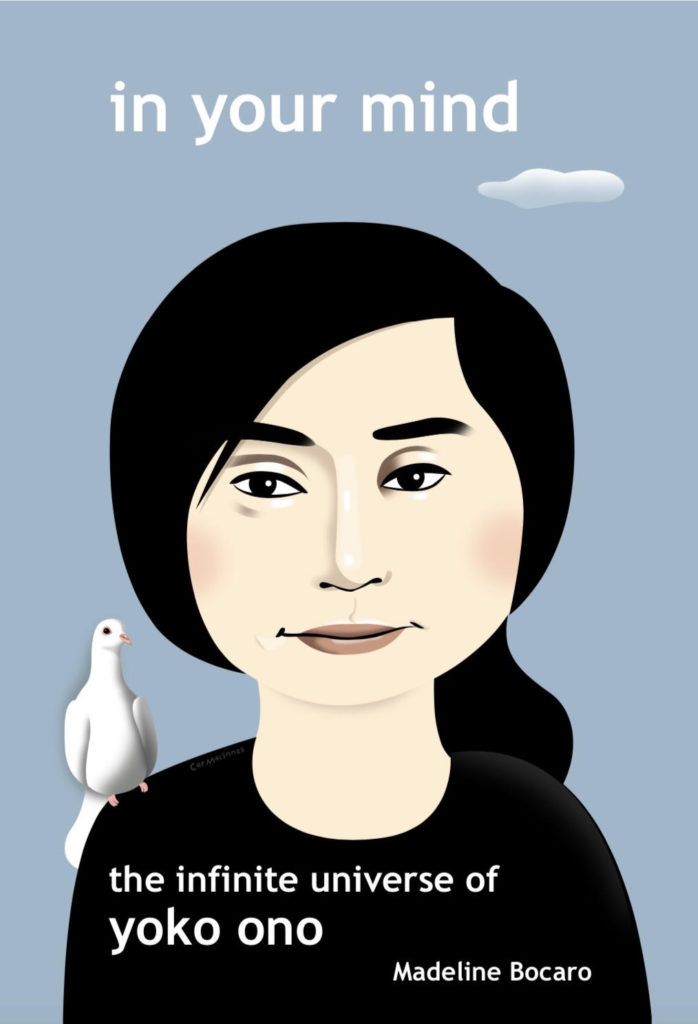
Yoko Ono may be one of the most misunderstood people on the planet. And also one of the most creative, in a number of fields. To get a full and respectful sense of Yoko as a person and an artist, consult the new book by Madeline Bocaro, in your mind: the infinite universe of Yoko Ono.
Yoko will celebrate her 90th birthday next February, and Madeline’s book is a perfect way to prepare for what is likely to be a new round of articles, social media posts, and events about someone many people still think of mainly in relation to John Lennon and The Beatles, but is so important on her own.
A sampling of her impact on many important institutions includes:
Art Institute Chicago: Mended Petal, 2016
Getty: T.V. to See the Sky, Inspired by Yoko Ono’s work SKY T.V.
Hirshhorn: Four Works for Washington and the World June 17-September 19, 2017 and Wish Tree for Washington DC
MoMA/Museum of Modern Art: Yoko Ono artist page
San Francisco Museum of Modern Art (SFMOMA): YES YOKO ONO
Smithsonian Magazine: The Long and Winding Road of Yoko Ono’s Art
University of Liverpool: Yoko Ono Lennon Centre
Whitechapel Gallery: MEND PIECE for London
I discovered the book when Madeline was interviewed in June by Deborah Kalb for Deborah’s Book Q&As. I tweeted a quote from the interview, “Unfortunately, as articulate as Yoko is, she was always publicly asked the same questions about John or the Beatles,” and also included it in my recent post “Writing, Research, and Creativity Quotes from Deborah Kalb Book Q&As: 1st Half of 2022.”
In the book’s introduction, Madeline writes “Yoko sees things that we do not see, hears things that we can’t hear, and knows things that we do not know. She is certain that one day there will be peace on Earth, and lives her life as if it is undoubtedly so.”
Madeline agreed to answer my questions about the book, which I view as an admirable and informative, lifelong labor of love:
How did you devise the somewhat non-linear structure of in your mind: the infinite universe of Yoko Ono? This would include not only the length of the book, but the large number of chapters, many including fragments of interviews, tweets, newspaper/magazine articles, etc.
I had been writing articles/stories about Yoko all my life (since the early 1970s). When I was given software which allowed me to organize my separate Word documents, it evolved into a 558-page book about Yoko’s life! It is somewhat in chronological order, but I took some liberties with the flow, which people are responding to in a very positive way. Yoko’s voice is prominent throughout the book, because she has always been so eloquent and extremely interesting. There are also many quotes (taken from my vast archive) from John Lennon, their son Sean and many others who were intimate friends of John and Yoko. Their words back up all the facts, and dispel mistruths that have been perpetuated for decades.
My sense is that a recurring theme of your book is Yoko Ono’s hard-won wisdom, resilience, and philosophy of life and art. Do you consider her to be a philosopher, even if she is not called that, and perhaps does not think of herself in that way?
I believe that Yoko arrived at her extremely high level of wisdom from having to survive horrible situations and conditions throughout her life, beginning in her childhood. She most likely considers herself to be a survivor, rather than a philosopher. Her objective is to show us that we have completely misplaced our values. She awakens us to our own inner power.
Reading through your book makes me think that Yoko Ono embodies several important trends of 21st century life: the gig economy, personal branding, and, for lack of a better term, productive aging. Do these themes resonate for you in terms of her life and work?
Not only did she unwittingly pre-date those themes, but also her ideas of ecology, women’s equality and rights were way ahead of their time. John Lennon was the first man to publicly admit that he was a househusband. Her second husband had raised their daughter. The theme of productive aging is relevant to the age in your mind.
Yoko has taught me so much about life – mainly that most important things are invisible – and that we take nature for granted, as we see in most of her work. I have gone way beyond what most people know about Yoko. Her extraordinary life is not only fascinating, but reveals many truths and lessons from which we can all benefit.
